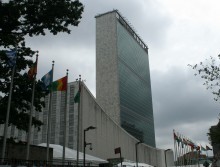 A United Nations Security Council (UNSC) resolution condemning the Syrian government for its ongoing violent crackdown against protesters in its country was vetoed Tuesday by Russia and China. US envoy to the UN Susan Rice said the US was “outraged” by the failed vote, while the European Union was “very disappointed”, according to an EU spokesperson who spoke with The Mideast Update. The Russian-Chinese joint veto scuttled what had been a extensive attempt to secure stronger international comment against abuses by the regime of Bashar al-Assad.
A United Nations Security Council (UNSC) resolution condemning the Syrian government for its ongoing violent crackdown against protesters in its country was vetoed Tuesday by Russia and China. US envoy to the UN Susan Rice said the US was “outraged” by the failed vote, while the European Union was “very disappointed”, according to an EU spokesperson who spoke with The Mideast Update. The Russian-Chinese joint veto scuttled what had been a extensive attempt to secure stronger international comment against abuses by the regime of Bashar al-Assad.
A draft of the resolution posted on the UN website would have had the UNSC strongly condemn “the continued grave and systematic human rights violations” by the Syrian authorities. It also said the Council intended to consider further options, including the UN Charter section allowing sanctions, following a review of Syria’s implementation of the resolution demands.
The resolution had been “vastly watered-down” even before the veto, according to Rice, who expressed harsh words to the Council following the no votes. “Several members have sought for weeks to weaken and strip bare any text that would have defended the lives of innocent civilians from Assad’s brutality, ” Rice was quoted as saying in a press release from the US Mission to the UN.
“Today, two members have vetoed a vastly watered-down text that doesn’t even mention sanctions… The courageous people of Syria can now clearly see who on this Council supports their yearning for liberty and universal human rights—and who does not.”
The Europeans, who recently upgraded their own sanctions against Syria, were not happy with the vote outcome and pledged to keep trying. “We will continue to press for strong UN action and to press the UNSC to take its responsibilities regarding what is a very worrying situation in Syria,” said the EU spokesperson in an email to The Mideast Update.
“This is a time when the international community needs to come together to help the Syrian people achieve their legitimate aspirations. We will pursue our efforts, together with international partners, to increase pressure on the Assad regime. We already have our own sanctions in place and will continue to review the list.”
Rice said the US would also keep pressing the issue before the Security Council. “We will not rest until this Council rises to meet its responsibilities,” she was quoted as saying.
Russia and China are two of the five Security Council nations with veto powers. According to a press release on the UN website, the Syrian resolution would have otherwise passed as nine members voted yes. Brazil, India, Lebanon and South Africa abstained.
The Syrian repression of anti-regime protesters has killed more than 2,700 people according to the UN. Said Rice of the situation, “For more than six months, the Assad regime has deliberately unleashed violence, torture, and persecution against peaceful protesters, human rights defenders, and their families.”
The UN website summary of the Council meeting said the Russian envoy to the UN, Vitaly Churkin, expressed concern over a number of factors in the resolution he vetoed. Included among those was the “accusatory tone against Damascus,” the “ultimatum of sanctions” and the failure to take into account Russian proposals on the “non-acceptability of military intervention,” according to the UN summary paraphrase.
While noting they were “not advocates of the Assad regime,” Churkin warned the collapse of the Assad government could destabilize the region. He said Russia and China had worked together on an alternative UN approach to Syria that had addressed their concerns.
Russia and China have traditionally been cautious about UN sanctions and both have their own connections to Middle East nations that run contrary to US and EU interests. Russia has long sold weapons to Syria as well. The US has called for an arms embargo against the Assad government, a step they have already taken on their own.
The Syrian discussion follows the military intervention by NATO into the Libya conflict. While that situation has led to the effective collapse of the authoritarian Muammar Gaddafi regime, the military action there has not been universally supported.
Rice dismissed concerns that strong Security Council action could be a “pretext” that leads to military action in Syria. “Let there be no doubt: this is not about military intervention. This is not about Libya. That is a cheap ruse by those who would rather sell arms to the Syrian regime than stand with the Syrian people.”
(By Joshua Spurlock, www.themideastupdate.com, October 5, 2011)
